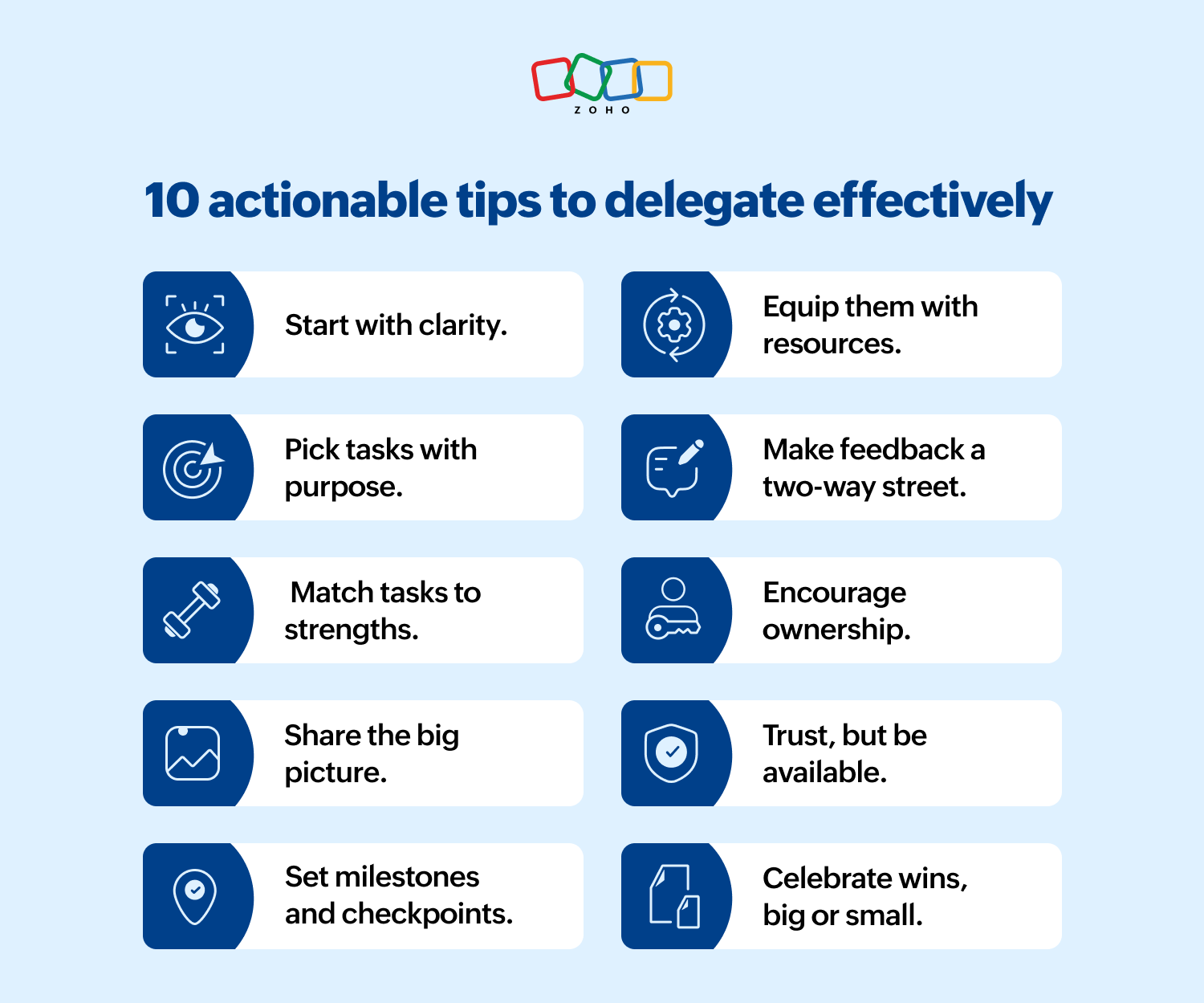- HOME
- All Topics
- Thought Leadership
- Master the art of delegation as a manager
Master the art of delegation as a manager
- Published : May 22, 2025
- Last Updated : May 22, 2025
- 48 Views
- 5 Min Read
Congratulations! You’ve recently been promoted to manager, a title you've worked hard for and earned. You walk into work with your head held high, a pep in your step, and the grit to get things done.
Then, you look at your to-do list, and it just keeps growing. A barrage of emails, tasks, and meetings. On top of this, you're supposed to manage people? It feels like you're the only one who can handle certain things. If you step away for a second, everything might just... stop. Maybe you’re even wondering if you secretly signed up to do three jobs instead of one.
Meanwhile, you look at your team. Good people, capable people, with energy and ideas. And you can't shake the feeling that maybe, just maybe, there's a way to tap into that collective power, not just to ease your load but to help them step up and grow.
If any of that rings true, we need to talk about delegation.

What is delegation?
Forget the dry definitions for a moment. Delegation isn't about pushing tasks off your plate because you're swamped (though that can be a happy side effect!). Delegation is, quite simply, choosing an individual or a group and saying, "I trust you with this."
As a good manager, you're not just handing over an item on your list. You're handing over a piece of ownership and an opportunity to contribute in a bigger way.
Delegation is:
- Not: “Here, do this for me.”
- But: “Let’s figure this out together. I believe you can.”
As a good manager, you:
- Show them how you do it.
- Tell them what's important.
- Ensure they have the right tools.
- Help them if they get stuck.
- Trust them to own it.
You're still invested in the work turning out great, but you're empowering them to gain the skill and the pride of doing it themselves.
Why managers shy away from delegating
Before we dive into how to delegate, let’s get real about why it can feel scary:
- “It’s easier to do it myself.”
Sure, explaining a task takes time. But what happens next week when you’re swamped and still the only one who knows how to do it? - “What if they do it better than me?”
Good. That’s the point. Your job isn’t to be the best at everything. It’s to build a team where everyone shines. - "I don’t want to be that manager who dumps work."
Delegation isn’t dumping. It’s investing. Imagine saying, “I’m giving you this because I think you’ll crush it.” How does that feel? - “But I’ll lose track of things!”
You might, for a bit. But micromanaging burns you out and frustrates your team.
Here’s the truth: Holding onto tasks isn’t dedication. It’s fear in disguise. Fear of mistakes. Fear of irrelevance. Fear of losing the “hero” role. But leadership isn’t about being the hero. It’s about creating more of them.
5 common myths about delegation
Let’s bust five common myths that trip up managers.
Myth #1: Delegation is just dumping your least favorite tasks.
This is probably the most damaging myth. Delegation isn't about clearing your plate by offloading boring or difficult tasks without thought. It’s to match the right task with the right person to help the team and the individual grow.
Myth #2: Delegation is just you slacking off.
Your job isn’t to tackle every task solo. It’s to make sure the work gets done through your team. As the "coach," you’re not playing the game—you’re calling the shots.
Myth #3: Once you delegate, you're totally hands-off.
Not really. Effective delegation doesn't mean abandoning the task or the person. You're still responsible for the outcome. You need to be available for questions, check in occasionally, and give feedback.
Myth #4: You should only delegate when you're completely swamped or going on vacation.
If you're only delegating on the way to the airport or when you're neck deep in work, there is a better way! Delegation works best as a regular habit, not an emergency measure. Doing it consistently builds your team's skills and resilience before you hit crisis mode.
Myth #5: Delegating complex or important work is too risky.
It feels safer to keep the high-stakes stuff to yourself. But trust me, some of the biggest growth moments for your team (they might even surprise you!) happen when you entrust a challenging task to the right person, with the right support. It shows you believe in them, and that belief can be incredibly motivating.
5 reasons why you should delegate
So, why bother with delegation anyway? Here's the lowdown:
1. Multiply your impact: You were promoted for a reason, right? Delegation gives you the time to focus on the bigger stuff that only you can do, like planning and making important decisions.
2. Develop your team: Delegation helps team members build skills, take ownership, and gain confidence. When they take on new things, they get better and more valuable.
3. Prevent burnout: Your energy is finite. Sharing work means you’re less likely to be mentally exhausted, and your team isn’t left waiting for you to clear their bottlenecks.
4. Builds trust: When you delegate, you're saying, "I believe in you." That makes your team feel good and work better together.
5. Leads to better solutions: Your team members bring fresh perspectives. When you trust them with tasks, they might solve problems in ways you never considered. Fresh eyes, fresh ideas.
10 actionable tips to delegate effectively
1. Start with clarity:
Start with a simple, direct explanation. What needs to be done? By when? Why does it matter? When your team knows exactly what’s expected, they’re more confident.
2. Pick tasks with purpose:
Delegate tasks that offer growth opportunities to your team, not just the ones you want off your plate. This keeps them engaged and motivated.
3. Match tasks to strengths:
Not every task is for everyone. Look at your team’s skills, interests, and growth areas. Find the right fit. A challenge for one might be routine for another.
4. Share the big picture:
Instead of just handing over a task, explain why it matters. Context adds value, making them more invested.
5. Set milestones and checkpoints:
Rather than breathing down their necks, agree on clear checkpoints. This keeps them on track without making them feel suffocated.
6. Equip them with resources:
Make sure they have everything they need—tools, information, access, or training.
7. Make feedback a two-way street:
Don’t just hand out advice. Ask how it’s going, where they’re stuck, and what they’d do differently. This keeps the dialogue open.
8. Encourage ownership:
Encourage them to make decisions within their scope. This builds confidence and accountability.
9. Trust, but be available:
Once delegated, step back. But let them know you’re there if they hit a roadblock.
10. Celebrate wins, big or small:
When they get it right, let them know. Recognition builds confidence and motivation. 
Wrapping up
Delegation isn't just a task-management technique. It isn't easy either. It takes practice, patience, and a willingness to build trust. It may feel a little uncomfortable at first, like any new skill. But as you get better at it, you'll see incredible changes.
Your own workload becomes more manageable, freeing you up for the strategic, high-impact work that truly matters. Your team becomes more skilled, more engaged, more confident, and more capable of tackling bigger challenges. The energy in the team shifts as people feel trusted and empowered.
So, take a breath. Look at your list today. What's one small thing you can delegate? Choose wisely, communicate clearly, offer support, and then... let go a little. Trust your team. It might just be the most impactful thing you do all week.
 Srinath Vijayakumar
Srinath VijayakumarSrinath is a product marketer for Zoho Workplace. He talks about productivity, tips to improve communication, and nuggets on doing your best at your workplace. He has great interest in bringing a fresh perspective to the forefront. He is highly optimistic to the extent that he opens the refrigerator every 10 minutes, hoping to find something new. Outside of work, you will catch him playing football, travelling or writing half-finished stories.


